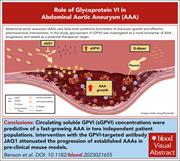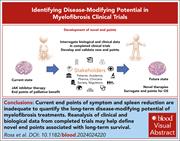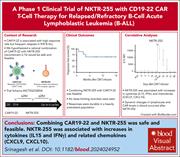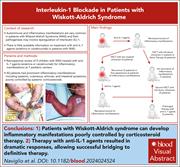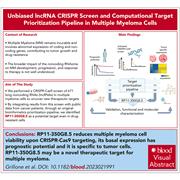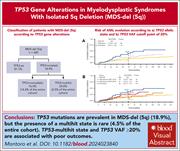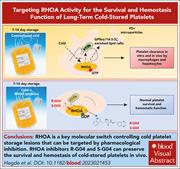Issue Archive
Table of Contents
BLOOD COMMENTARIES
PLENARY PAPER
Soluble glycoprotein VI predicts abdominal aortic aneurysm growth rate and is a novel therapeutic target
Abdominal aortic aneurysm (AAA) is associated with very high mortality if rupture occurs. In this Plenary Paper, Benson and colleagues use data from surgical specimens, 2 independent case-control studies, and 2 mouse models to define a critical role for platelets in AAA formation. The authors reveal that soluble glycoprotein VI (GPVI) is both a biomarker for AAA progression and a therapeutic target. This research should prompt pursuit of GPVI-targeted strategies to improve AAA management.
PERSPECTIVE
Identifying disease-modifying potential in myelofibrosis clinical trials
Clinical Trials & Observations
There is a high unmet need for new effective therapies for myelofibrosis (MF), a chronic, progressive myeloproliferative neoplasm, but the efficacy end points currently used in trials may not be the best for identifying natural history–altering novel agents. In this Perspective, Ross and colleagues challenge regulatory dogma and provide a clear and robust roadmap for advancing clinical trial design and end point validation in MF.
CLINICAL TRIALS AND OBSERVATIONS
A phase 1 clinical trial of NKTR-255 with CD19-22 CAR T-cell therapy for refractory B-cell acute lymphoblastic leukemia
Clinical Trials & Observations
Recurrence after current standard-of-care CD19 chimeric antigen receptor (CAR) T-cell therapy for B-cell acute lymphoblastic leukemia (B-ALL) is generally due to either loss of CD19 expression by leukemic cells or CAR T-cell dysfunction. In this phase 1 trial, Srinagesh et al demonstrate the safety and feasibility of administering a polymer-conjugated recombinant interleukin-15 agonist known as NKTR-255 to patients with relapsed/refractory B-ALL after infusion of a dual CD19- and CD22-targeted CAR T-cell product. The authors’ data provide impetus for further exploration of combinatorial therapy.
IMMUNOBIOLOGY AND IMMUNOTHERAPY
Interleukin-1 blockade in patients with Wiskott-Aldrich syndrome: a retrospective multinational case series
Clinical Trials & Observations
Brief Report
Wiskott-Aldrich syndrome (WAS) is an X-linked disorder characterized by eczema, microthrombocytopenia, and immunodeficiency, with difficult-to-treat inflammatory symptoms. Borrowing from experience in arthritis and inflammasomopathies, Naviglio et al show that inflammatory complications of WAS can be effectively treated with interleukin-1 blockade as a bridge to definitive therapy (stem cell transplantation or gene therapy).
LYMPHOID NEOPLASIA
An unbiased lncRNA dropout CRISPR-Cas9 screen reveals RP11-350G8.5 as a novel therapeutic target for multiple myeloma
Grillone et al used an unbiased screening strategy in the search for noncoding elements in the multiple myeloma (MM) genome that may be vulnerabilities. The authors demonstrate that the long noncoding RNA (lncRNA) RP11-350G8.5 negatively regulates the protein kinase RNA–like endoplasmic reticulum kinase pathway in MM to prevent the induction of immunogenic cell death and provide experimental support for targeting this lncRNA for therapeutic gain.
MYELOID NEOPLASIA
Influence of TP53 gene mutations and their allelic status in myelodysplastic syndromes with isolated 5q deletion
CME
Clinical Trials & Observations
Myelodysplastic syndrome with isolated 5q deletion [MDS-del(5q)] displays unique biology manifested by good prognosis and unique sensitivity to lenalidomide therapy. The impact of concurrent TP53 mutation on the natural history has not been understood, leading Montoro et al to study, in this month’s CME article, TP53 mutations and allelic burden in a large cohort of patients with MDS-del(5q) and mature follow-up. The authors found that TP53 was the most frequently mutated gene, occurring in 18.9% of cases, that risk of progression to acute myeloid leukemia was higher when TP53 was mutated, and that outcomes were considerably worse when either multiple TP53 mutations were present or the allelic burden exceeded 20%.
TRANSFUSION MEDICINE
Inhibition of RHOA activity preserves the survival and hemostasis function of long-term cold-stored platelets
The cold storage lesion is a major barrier to the use of refrigerated platelet concentrates. Hegde and colleagues identified that the activation of the small GTPase RAS homolog family, member A (RHOA), is necessary for the signals responsible for this lesion and that the genetic loss of RHOA makes platelets insensitive to refrigeration-induced clearance. Inhibition of RHOA ex vivo during cold storage preserves platelet survival and clotting activity of transfused platelets at similar levels as conventional room temperature–stored platelets. This research should prompt further translational research aimed at testing this approach clinically.
LETTER TO BLOOD
Directionality of HLA-DP permissive mismatches improves risk prediction in HCT for acute leukemia and MDS
BLOOD WORK
CONTINUING MEDICAL EDUCATION (CME) QUESTIONS
-
Cover Image
Cover Image
![issue cover]()
Red-stained lncRNA RP11-350G8.5, a newly identified potential treatment target for multiple myeloma, is located in the cell's cytoplasm. The cell’s nuclei are stained blue, and the green stain highlights a common cytoplasmic protein, GAPDH. See the article by Grillone et al on page 1705.
- PDF Icon Front MatterFront Matter
- PDF Icon Table of ContentsTable of Contents
- PDF Icon Editorial BoardEditorial Board
Advertisement intended for health care professionals
Email alerts
Advertisement intended for health care professionals


